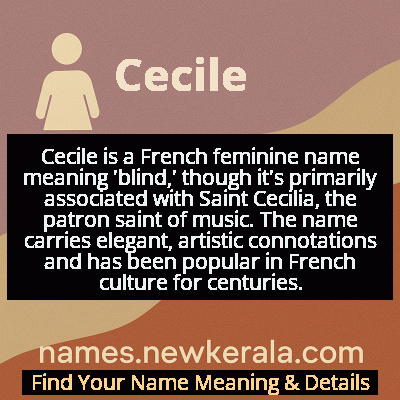Cecile Name Meaning & Details
Origin, Popularity, Numerology Analysis & Name Meaning of Cecile
Discover the origin, meaning, and cultural significance of the name CECILE. Delve into its historical roots and explore the lasting impact it has had on communities and traditions.
Name
Cecile
Gender
Female
Origin
French
Lucky Number
1
Meaning of the Name - Cecile
Cecile is a French feminine name meaning 'blind,' though it's primarily associated with Saint Cecilia, the patron saint of music. The name carries elegant, artistic connotations and has been popular in French culture for centuries.
Cecile - Complete Numerology Analysis
Your Numerology Number
Based on Pythagorean Numerology System
Ruling Planet
Sun
Positive Nature
Leaders, ambitious, highly driven, self-reliant, innovative.
Negative Traits
Overly aggressive, domineering, impatient, selfish.
Lucky Colours
Red, orange, gold.
Lucky Days
Sunday.
Lucky Stones
Ruby, garnet.
Harmony Numbers
2, 3, 9.
Best Suited Professions
Entrepreneurs, managers, engineers.
What People Like About You
Courage, determination, leadership.
Famous People Named Cecile
Cécile De France
Actress
Internationally recognized French actress with numerous award nominations
Cécile Chaminade
Composer
First female composer awarded France's Legion of Honour
Cécile McLorin Salvant
Jazz Singer
Multiple Grammy Award-winning jazz vocalist
Cécile Corbel
Singer and Harpist
Composed soundtrack for Studio Ghibli's 'The Secret World of Arrietty'
Name Variations & International Equivalents
Click on blue names to explore their detailed meanings. Gray names with will be available soon.
Cultural & Historical Significance
In French culture, Cecile (typically spelled Cécile) gained prominence during the 18th and 19th centuries among aristocratic families and later spread to the bourgeoisie. The name appears in French literature, most notably in Rousseau's 'Julie, or the New Heloise' where Cécile represents innocence and virtue. The name's elegant, classical sound and saintly associations made it a favorite among French Catholic families, and it maintained steady popularity through various historical periods, representing both religious devotion and cultural refinement.
The name's enduring appeal lies in its ability to bridge sacred and secular traditions, making it a versatile choice that honors both religious heritage and artistic expression. Its presence in multiple European cultures demonstrates its cross-cultural adaptability while maintaining its core identity as a name of grace, music, and spiritual depth.
Extended Personality Analysis
Individuals named Cecile are often perceived as graceful, artistic, and introspective. They tend to possess a natural elegance and refined sensibility that draws others to them. Many Ceciles demonstrate strong creative abilities, particularly in music, writing, or visual arts, reflecting the name's association with Saint Cecilia. They often have a quiet confidence and thoughtful nature, preferring meaningful conversations to superficial chatter. Their artistic inclinations frequently manifest as a deep appreciation for beauty in all forms, from music and literature to nature and human relationships.
Ceciles are typically known for their loyalty and depth of character. They form strong, lasting relationships and value authenticity in themselves and others. While they may appear reserved initially, they possess inner strength and resilience that serves them well during challenging times. Their thoughtful approach to life often makes them excellent listeners and trusted confidantes. Many Ceciles balance traditional values with modern perspectives, creating a unique blend of stability and adaptability that serves them well in both personal and professional contexts. They often exhibit a nurturing quality, whether in family relationships, friendships, or professional caregiving roles, combined with a strong sense of personal integrity that guides their decisions and actions.
Modern Usage & Popularity
In contemporary naming practices, Cecile maintains its status as a classic choice that bridges traditional elegance with modern sensibility. While it peaked in popularity during the early 20th century, the name has experienced a notable revival in recent decades as parents seek names with historical depth, international appeal, and artistic connotations. In France, Cécile remains consistently used, typically ranking outside the top 100 but maintaining steady usage across generations. The name enjoys particular popularity among families with musical or artistic backgrounds due to its association with Saint Cecilia, the patron saint of music. Internationally, Cecile appears across French-speaking countries and has gained growing interest in English-speaking nations as parents discover its melodic quality and rich heritage. The name's versatility allows it to work well in professional contexts while retaining its romantic, artistic connotations, making it an appealing choice for parents who want a name that is both distinctive and grounded in tradition.
Symbolic & Spiritual Meanings
Symbolically, Cecile represents the profound paradox of 'blindness' transformed into spiritual insight and inner vision. While the literal etymology derives from the Latin 'caecus' meaning 'blind,' the name has evolved to symbolize the ability to perceive truth beyond surface appearances and to see with the heart rather than mere physical sight. This connects to deeper philosophical concepts about intuition, faith, and the perception of essential truths that transcend visual evidence. The strong musical association with Saint Cecilia adds layers of symbolism related to harmony, creativity, emotional expression, and the universal language that connects humanity across cultures. Cecile embodies the concept of grace under pressure and spiritual resilience, reflecting the saint's martyrdom with dignity and unwavering faith. The name also carries connotations of purity, devotion, and artistic sensitivity, while its French variant suggests sophistication, cultural refinement, and European elegance. Ultimately, Cecile symbolizes the alchemical transformation of potential limitations into unique strengths and the transcendent power of art and faith to overcome earthly constraints.

